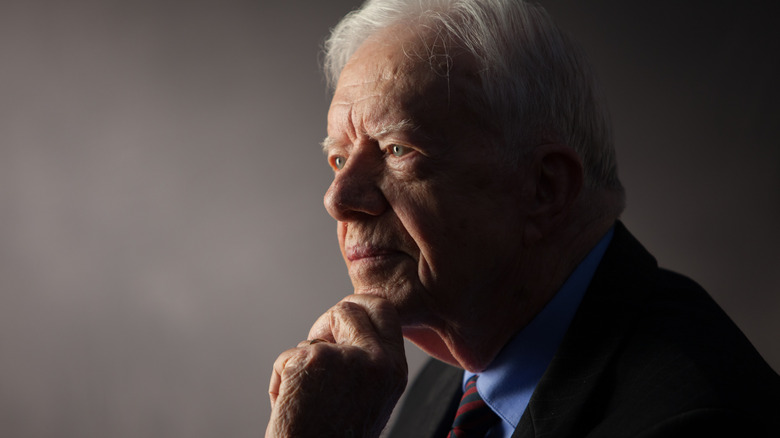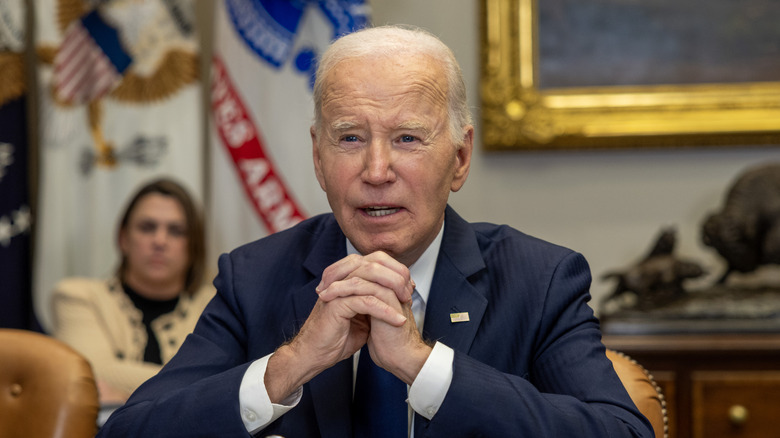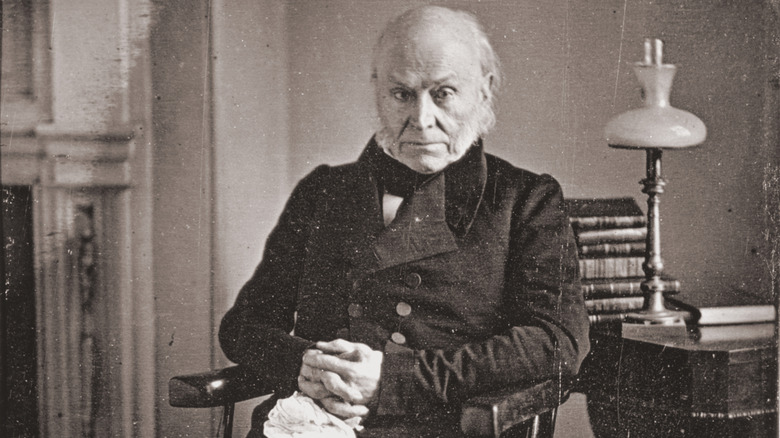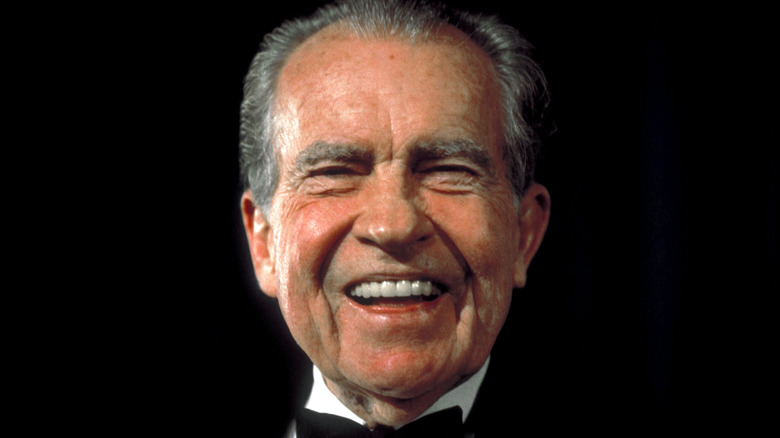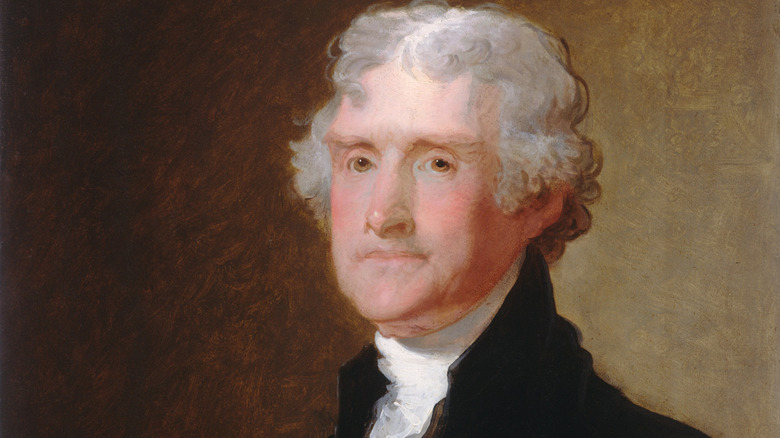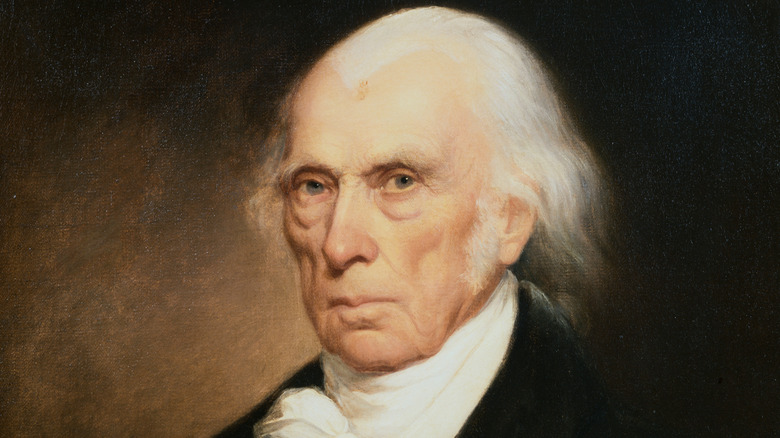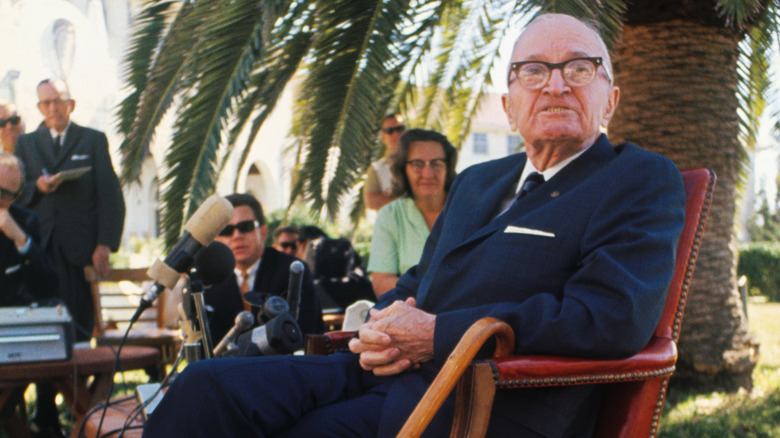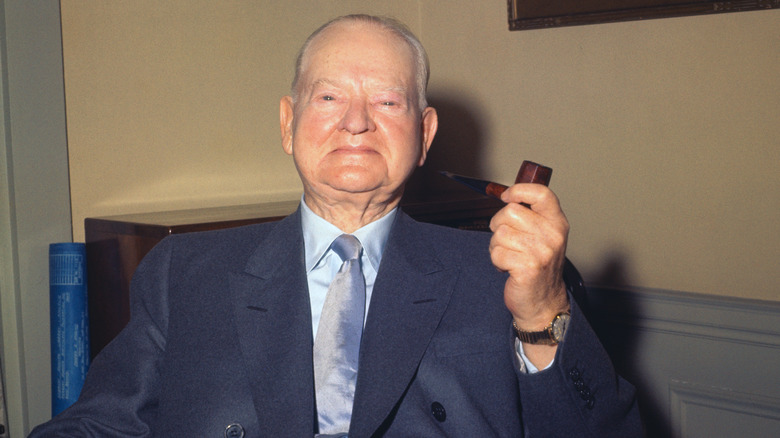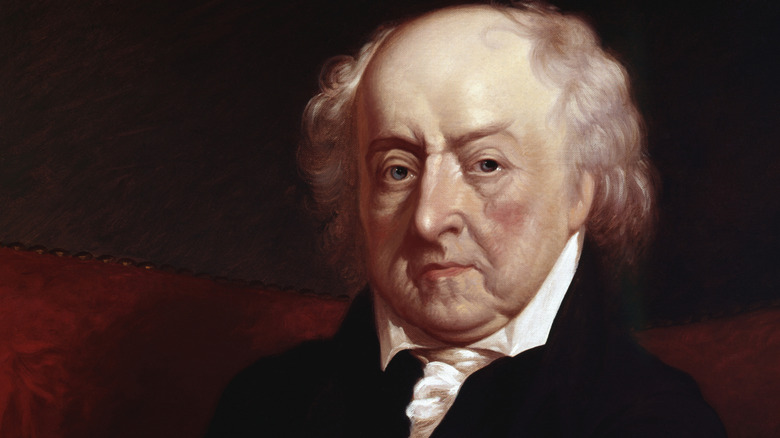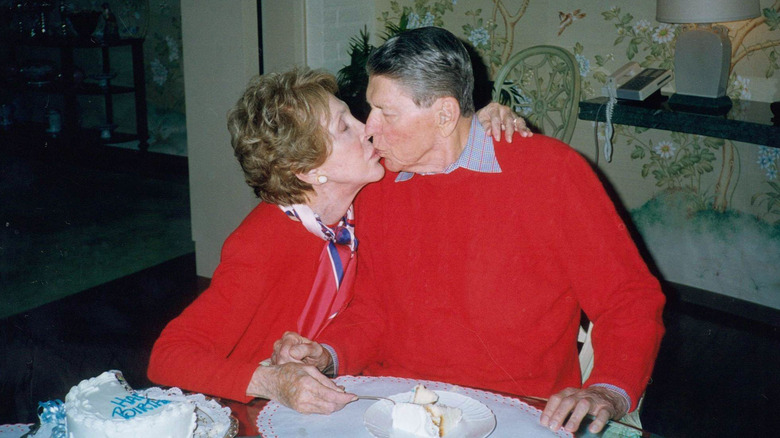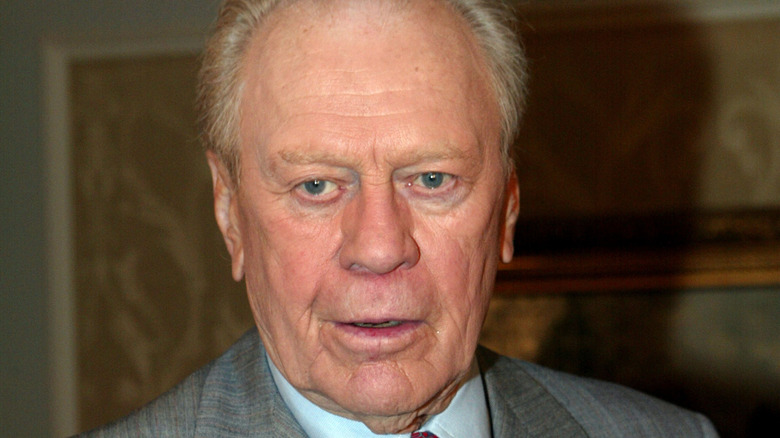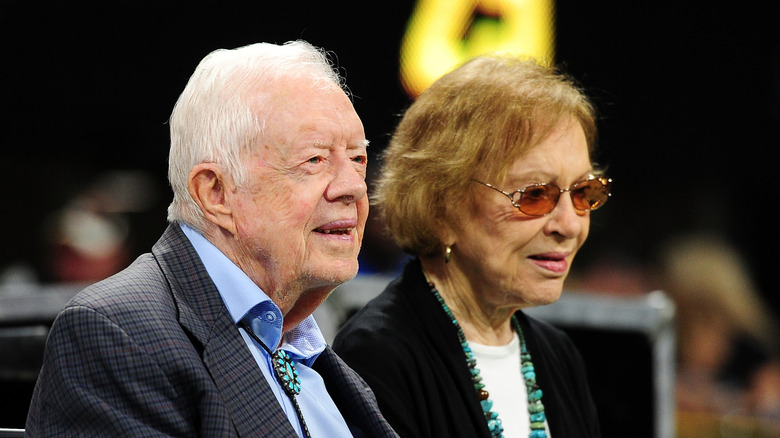12 United States Presidents Who Lived The Longest
Considering the dramatic way American presidents age during their presidency, it's kind of amazing that some of them went on to live as long as they did. Twelve of them have managed to live to be at least 80 so far, and that number can only increase. There are very few former presidents still alive as of 2025, but Donald Trump, George W. Bush, and Bill Clinton are all on the cusp of 80 at time of writing. With medical advances being as good as they are, it's possible we will soon see several more former presidents move up this list.
Not all of these men who made it to 80, 90, or even 100 were among the oldest presidents when they were in office, though. Some of them just lived quite a long time after they left the White House. This meant they often had decades to fill in retirement. Once you leave the most powerful job in the world, what do you do with the rest of your life? These former presidents had to figure it out as they went.
Here are the 12 United States presidents who lived the longest.
Joe Biden
Joe Biden is already in the top tier when it comes to longest-lived presidents, and since he is still alive and kicking as of 2025, he could continue to move up in the rankings. He was born on November 20, 1942, making him 82 at the end of his time in the White House.
Biden spent his early 80s, well, being president. His advanced age was a huge talking point during the 2024 campaign, despite his opponent Donald Trump being just a few years younger. However, it became enough of an issue that people started talking about the need for age limits on presidential candidates, and Biden ended up dropping out in favor of his more than two decades-younger vice president, Kamala Harris.
Despite his age, Biden made clear he will continue to work in politics, just not from elected office. Instead, he plans to continue his work with the University of Delaware's Biden Institute, the Penn Biden Center for Diplomacy and Global Engagement, and the Beau Biden Foundation. Appearing on "The View" (via CBS News) in September 2024, he said, "I'm less concerned about what my legacy is. Although I'm leaving, I'm not going away, because there's so many other things I want to do in terms of the Biden Institute on foreign policy, Biden Institute in Delaware on domestic policy, to keep the things going that we started. And I think we'll get it done." He is also expected to get to work on building his presidential library.
John Quincy Adams
John Quincy Adams, the sixth president of the United States (and son of the second one), was born on July 11, 1767. He was a one-term president, losing to Andrew Jackson in 1828. However, he found retirement boring and almost immediately agreed to run for office again. This time, he did not leave politics until the day he died, literally, spending his final years in the House of Representatives. Adams was elected to the House two years after he lost the White House and served nine terms.
He became an active abolitionist and successfully defended the Amistad mutineers, enslaved people who had fought back against their captors aboard a slave ship, in 1841. In 1843, less than five years before he died, he wrote in his diary, "Before my lamp is burnt out, I am desirous that my opinions concerning the great movement throughout the civilized world for the abolition of Slavery should be explicitly avowed and declared — God grant that they may contribute to the final consummation of that event" (via the Primary Source Cooperative). The former president also had a fascination with science and helped lay the metaphorical cornerstone for what would become the Smithsonian Institute, as well as traveling to lay the literal cornerstone for the Cincinnati Observatory.
In 1848, Adams was on the floor of the House when he collapsed. He was too ill to move to another location, so he died in the Capitol building two days later on February 23, aged 80 years, 227 days.
Richard Nixon
Richard Nixon was born on January 9, 1913. While he went on to become the 37th president of the United States and won a second term in 1972, he would resign the office in disgrace less than two years later after the Watergate scandal brought him down. This meant he had a bit of a different path in retirement than other long-lived presidents. Rather than continue on in politics in an unelected elder-statesman role immediately, Nixon needed to wait until the events of Watergate receded further into the past.
So Nixon spent his final years gradually becoming active in politics again, both internationally and domestically. Presidents from both parties consulted him for advice, although they did so quietly, not letting the public know about it. He met with world leaders, including Mikhail Gorbachev and Deng Xiaoping, but only as a private citizen. However, he was sent as an official representative of the U.S. to the funeral of Egyptian President Anwar al-Sadat.
Nixon also wrote several bestselling books and did successful speaking tours. He was not given an official presidential library until 2007, but he built the Richard Nixon Library and Birthplace Foundation as a sort of mini version of one; it opened in 1990. His former first lady, Pat, died in 1993. Nixon died less than a year later on April 22, 1994, aged 81 years, 103 days.
Thomas Jefferson
America's third president, Thomas Jefferson was born on April 13, 1743. He left office after two terms in 1809 and spent his final decades micromanaging the building of the University of Virginia, writing endless letters to seemingly everyone on earth, inventing things, and trying to keep from going broke.
It is perhaps not surprising that a man with such an active mind was most concerned with losing his faculties as he aged. He wrote to John Adams in 1822 (via The Atlantic), "I have ever dreaded a doting old age; and my health has been generally so good, and is now so good, that I dread it still." Two years later he hosted a large party for a dignitary at his home but handed off his speech to another man to read out. Part of it read, "My friends, I am old, long in the disuse of making speeches, and without voice to utter them. In this feeble state, the exhausted powers of life leave little within my competence for your service."
As Jefferson lay dying, he asked his doctor more than once to see if it had gone midnight. Once it had, he died on July 4, 1826, aged 83 years, 82 days. It was the 50th anniversary of the signing of the Declaration of Independence. (His old frenemy John Adams died just hours later.)
James Madison
James Madison, the future fourth president of the U.S., was born on March 16, 1751. He was already 66 years old when he left the White House after two terms in 1817. He returned home to Virginia where he got involved in new farming techniques and preservation.
Of course, that farm was actually a plantation, where Madison enslaved up to 100 Black men, women, and children. Despite being an enslaver himself, Madison had mixed feelings about the institution and spent his final years trying to figure out what the U.S. should do about slavery. He started to believe in some sort of very limited emancipation, while holding terrible ideas about Black people and feeling sure the white population would never be okay living in an integrated society. These ideas led him to help found and run a society that thought it would be a good idea to send Black people to Africa.
Madison was also heavily involved with the University of Virginia, which Thomas Jefferson had founded. After Jefferson's death in 1826, Madison became even more hands-on with the educational institute. Madison died on June 28, 1836, aged 85 years, 104 days. He did not free any of the people still enslaved on his plantation in his will.
Harry S. Truman
Harry S. Truman was born on May 8, 1884. Thrust into the presidency near the end of World War II after Franklin D. Roosevelt's death, he refused to run for a second elected term as president, returning to his modest home in Missouri in 1953. He spent the next two decades there, living a surprisingly normal life. Fans could even walk right up to his front door, and he would come out and chat with them. He only attempted one long road trip, driving the car himself, and he was pulled over by a police officer for an illegal maneuver.
Truman's obsession during his retirement was building his presidential library and cementing his legacy. Since he didn't stray far from his house, he built the library in his hometown of Independence. Once it was completed, this allowed him to use the library as his office, and he went there often, happily meeting with the scholars who came to study him and his administration. He also remained active in politics, but only in an elder-statesman role, talking with all of the presidents who came after him.
Truman died of old age on December 26, 1972, aged 88 years, 232 days. His wife Bess did not agree to a state funeral for her husband, opting instead for a memorial service at the Truman Library.
Herbert Hoover
Herbert Hoover was born on August 10, 1874. He was famously president during the start of the Depression, and his post-presidency popularity suffered because of it. One example of this was the controversy surrounding the naming of the Hoover Dam. The dam had already been built and dedicated, but some didn't approve of it honoring Hoover after he lost to Franklin D. Roosevelt in 1932. When people in government started calling it by different names after the unpopular Hoover left office, the House of Representatives had to officially declare that its name was the Hoover Dam in 1947. Harry S. Truman, who was president at the time, was close with Hoover and instrumental in making sure the name stayed. Two years before he died, Hoover wrote to Truman, saying, "Yours has been friendship which has reached deeper into my life than you know" (via the Herbert Hoover Presidential Library and Museum).
The former president spent his final years fishing and traveling, plus he remained heavily involved in politics. Although he never held an elected position again after leaving the White House, he was constantly asked to lead important commissions or diplomatic efforts, which he usually accepted and was very successful at.
Hoover died of colon cancer on Oct 20, 1964, aged 90 years, 71 days.
John Adams
John Adams was born on October 30, 1735. He became the second president of the United States and was the father of John Quincy Adams, the sixth president. The elder Adams passed on not just political savvy but longevity to his son, and they were both two of the longest-lived presidents.
Adams Sr. spent his final years on his farm in Massachusetts. In fact, he barely left it the whole two and a half decades of his retirement. In the 1865 book "Looking Toward Sunset: From Sources Old and New, Original and Selected" by Lydia Maria Francis Child, a fellow politician claims Adams once told him, "Old minds are like old horses; you must exercise them if you wish to keep them in working order" (via the Library of Congress). Whether Adams actually said it or not, it did capture how he approached old age. He spent his time writing prolifically, including composing his autobiography. He also kept up a regular correspondence with Thomas Jefferson, discussing politics, religion, and other weighty subjects.
Adams died on July 4, 1826, the 50th anniversary of the signing of the Declaration of Independence, aged 90 years, 247 days. Thomas Jefferson had died several hours before, but, unaware of this, Adam's last words were allegedly, "Thomas Jefferson survives."
Ronald Reagan
Ronald Reagan was born on February 6, 1911. After he left the White House in 1988, he returned to Los Angeles. There he worked on building his presidential library. He also did some traveling, including giving a very controversial speech in Japan. The public was shocked not by what he said in that speech but what he was paid: $2 million.
Unfortunately, just six years after he left the White House, Reagan was diagnosed with Alzheimer's disease, which meant he had only a short time of active retirement. He decided to tell the country the truth about his health, releasing a statement that said in part (via the Ronald Reagan Presidential Library and Museum), "My fellow Americans, I have recently been told that I am one of the millions of Americans who will be afflicted with Alzheimer's disease. ... I intend to live the remainder of the years God gives me on this earth doing the things I have always done. I will continue to share life's journey with my beloved Nancy and my family. I plan to enjoy the great outdoors and stay in touch with my friends and supporters. ... I now begin the journey that will lead me into the sunset of my life."
Despite Reagan insisting in the statement that he felt fine, it marked the end of his public life. After that, he lived quietly at home as the disease progressed. Reagan died on June 5, 2004, aged 93 years, 120 days.
Gerald Ford
Gerald Ford was born on July 14, 1913. He was thrust into the presidency in 1974 when Richard Nixon resigned, after less than a year as his vice president. Ford then lost the 1976 presidential election to Jimmy Carter. Despite this, Carter and Ford later became friends.
Ford spent his final years writing books, giving speeches, and golfing. He briefly considered returning to politics when Ronald Reagan asked him to be his vice presidential running mate in 1980. While Ford was still thinking it over, a disagreement led to Reagan changing his mind. After that, Ford limited his involvement to serving on commissions and writing about politics. He went into the business world, serving on several boards of directors. He also received the Presidential Medal of Freedom from President Bill Clinton in 1999, as a thank-you for doing his best to smooth over the problems Nixon left behind.
During his lifetime, Ford became the longest-lived president. He passed Ronald Reagan's record in 2006, just 44 days before his own death. He said in a statement at the time, "The length of one's days matters less than the love of one's family and friends" (via USA Today). Ford died on December 26, 2006, aged 93 years, 165 days.
George H.W. Bush
George H.W. Bush was born on June 12, 1924. After his defeat by Bill Clinton in 1992 after just one term in the White House, Bush returned to his two homes, spending his final years in Texas and Maine. He did stay involved in politics a bit and was hands-on with the political careers of his sons, George W. and Jeb. He was also actively involved in the building of his presidential library.
The turning point in Bush's old age was the death of his wife Barbara on April 17, 2018. After she died, it became obvious to those who knew him that the former president would join her soon. His friend and former chief of staff John Sununu told People, "He was not really looking as good as the last time I had been with him. It was pretty clear he was on a downward slope." But Bush didn't seem to know this himself. He assured those around him he had a lot of life left in him, even telling one friend he hoped to live to be 100.
Sadly, this was not to be. But as his time approached, his pastor told The New York Times that the former president was ready to go: "There was no question he knew where he was going and who he was going to be with. He was looking forward to being with Barbara..." Bush died on November 30, 2018, just seven and a half months after his wife, aged 94 years, 171 days.
Jimmy Carter
Jimmy Carter was born on October 1, 1924. He served only one term, losing to Ronald Reagan in 1980. Not only did he live to be older than the rest of them, but Jimmy Carter lived longer after ending his presidency than any other U.S. president, as well. This meant he had decades of retirement from politics to fill. And fill them he did. Carter completely reinvented what a president could do once he left the White House. Besides his work with charities (most famously Habitat for Humanity), he also remained an important player in American diplomacy. Otherwise, he lived simply with his wife in their old Georgia home.
His amazing charitable efforts resulted in his winning the Nobel Peace Prize in 2002. He told a reporter in 2006, "Certainly my reputation has been better in the post-presidential years than maybe in the White House. But I think that when people look at ... what we did in the White House, I think there's a lot there of justifiable pride." (via CBS News).
Carter died on December 29, 2024, aged 100 years, 89 days. Years earlier, Carter and former president Gerald Ford had written eulogies for each other. While Ford had died almost two decades before, his son read what his father wrote at Carter's state funeral: "Honesty and truth-telling were synonymous with the name Jimmy Carter. ... For Jimmy Carter, honesty was not an aspirational goal — it was part of his very soul" (via PBS NewsHour/YouTube).
